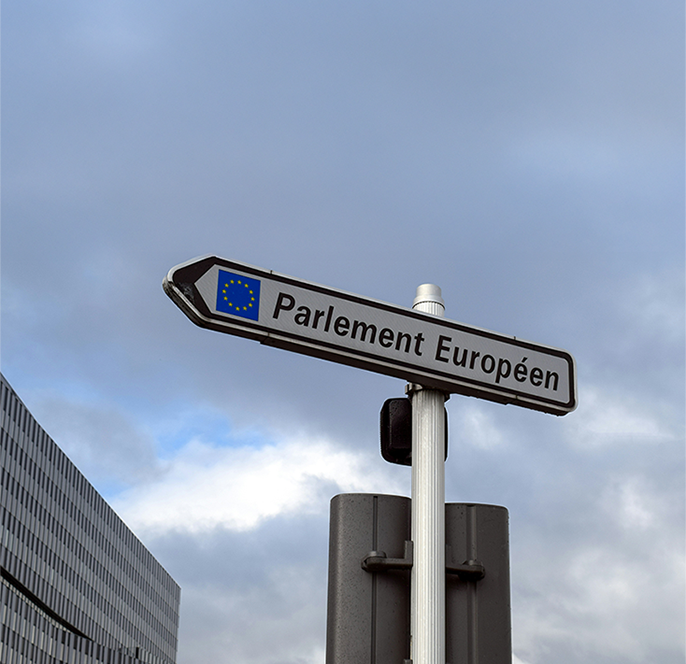Blog post
Will Brexit turn the European Parliament upside-down ?
Christine Verger, Vice-president, Jacques Delors Institute,
analyses what practical impact Brexit has on the European Parliament.
(translation from french: Lauren Clark)
There was much emotion during the European Parliament’s last session in January in Strasbourg. But this was not the case for the 29 deputies of Nigel Farage’s Brexit Party, elected in May 2019 (nor for the only pro-Brexit conservative deputy), who had also turned away during the European anthem at the inaugural session in July 2019. Having found no accomplices within the new Parliament, they now sit among the non-attached members.
But for the other 43 MEPs (Labour, Liberals, Greens, Conservatives – all opposed to Brexit), the departure from the European Parliament on the 31st of January is heart-breaking, and for many of their colleagues from other countries as well.
Hemicycle numbers after Brexit
A Council decision made on the 28th of June in 2018 established the composition of the European Parliament for the 2019-2024 parliamentary term, which included the Brexit hypothesis. 751 MEPs were therefore elected following the 2019 elections, as Brexit had not yet been effective at that date. The UK is due to leave the European Union on January 31st, 2020. Following this date, the European Parliament will have only 705 MEPs. Indeed, the Council decided that out of the 73 seats that would be left empty by the British departure, 46 of them would be reserved in the possible case of future enlargements, and/or in the event of the creation of a transnational constituency. 27 seats remain to be filled, which were, up until now, frozen (some members had even given these seats the name “Picard MEPs”), and which will be distributed among 14 member states. These states are considered to be under-represented, regarding their changing demographics since 2014.
No member states lose a seat. Legal and administrative arrangements have been made to ensure that there is no need to organise elections in the countries concerned.
The countries in question are listed beside.
With 705 seats, the simple majority decreases thus from 376 to 353.
Political groups after Brexit
The 7 political groups in the European Parliament will be variously impacted by the departure of the British MEPs.
Seats before Brexit

Seats after Brexit

The EPP group, which did not have any British MEPs, are strengthened with 5 additional MEPs (187 deputies, corresponding to 26.4% of the seats).
The S&D group loses 10 Labour MEPs but gains 4 additional MEPs (148 deputies, corresponding to 21% of the seats).
The Renew group loses its 17 British MEPs and gains 6 (97 deputies, corresponding to 13.8% of the seats).
The Greens-EFA group loses 11 MEPs and gains 5 (68 deputies, corresponding to 9.6% of the seats).
The Identity and Democracy group gains 3 MEPs (76 deputies, corresponding to 10.9% of the seats).
The ECR group loses its 4 British MEPs (62 deputies, corresponding to 8.8% of the seats).
The GUE group loses 1 elected representative (40 deputies, corresponding to 5.7% of the seats).
And finally, the non-attached members lose all the British deputies, leaving only those from the Italian Five Star Movement.
Below is a table of the national parties of the additional MEPs and their affiliation by political group.

What conclusions can be made in the short term?
The political landscape of the European Parliament will not be entirely changed after the 31st of January, especially with a strong ‘pro-European’ majority remaining.
Nonetheless, three elements are worth mentioning:
- The EPP consolidates its position as the largest group.
- The Identity and Democracy Group notably takes 4th place from the Greens, which can have both a political and psychological effect: particularly, on the speaking order in the plenary session and on obtaining reports. However, the ‘cordon sanitaire’ put in place by the main groups in the European Parliament, which prevents members of the ID group from assuming positions of responsibility, will most likely continue to be applied. Similarly, the organisation of parliamentary committees (Presidencies, vice-presidencies) will remain unchanged until the mid-term. Only positions held by British officials will be subjected to internal elections, and in particular, the Presidency of the Committee on Legal Affairs and the Committee on Fisheries. From the French perspective, the République en Marche and the National Rally (Rassemblement National) will be even, each having 23 elected representatives.
- Does this situation suggest further changes in the political balance of power? What will happen to the 13 members of Victor Orbán’s Fidesz, currently suspended from the EPP, but not excluded? The EPP is preparing a report on the subject, and Victor Orbán himself is contemplating the possibility of joining the Polish PIS MEPs in the ECR group. The other question concerns the Italian Five Star Movement, which currently resides among the non-attached members. Seeing that the political situation at the national level has evolved in Italy, the Greens in particular, and even the Liberals, are wondering whether the Five Star Movement should be integrated into their groups. However, this would not be an easy task considering the unpredictability of the Italian movement and its internal divisions.
All of which are questions to be addressed in 2020.
SUR LE MÊME THÈME
ON THE SAME THEME
PUBLICATIONS
What’s happening in the European Parliament?

Lessons learned from the implementation of crisis response tools at EU level

Commonalities and fault lines in EU economic policy visions

MÉDIAS
MEDIAS
Ce qu’attendent les Britanniques de la nouvelle année

Le Parlement européen valide la Commission von der Leyen II

Une majorité d’eurodéputés retiennent du rapport d’Enrico Letta le besoin de réduire la bureaucratie

ÉVÉNEMENTS
EVENTS
Euroquestions #62 | One year ahead of the 2024 European elections

Académie Notre Europe | Session in Brussels [FR]

Euroquestions | What place for Europe in scottish nationalism ? (FR)

Delivering the 2021-27 MFF and NGEU: How to match strategy, resources and expectations?

The EU-UK deal – A basis to build upon?

Differentiated Integration and the Future of Europe: Promises, Pitfalls, Pathways

Euroquestions | Relance et puissance : mots d’ordre de la rentrée européenne

Wébinaire | Le Parlement européen, acteur de la réponse à la crise du Covid-19

Negotiating the Future EU-UK Relationship in times of Pandemics

Conférence
Royaume-Uni et Union européenne :
quel partenariat futur ?

Listen to the ECIPE Seminar:
After Brexit – What’s next for EU-UK relations?

EU Budget 2021-27 : Challenges and opportunities

Académie Notre Europe – Europe of human rights and values

Copenhagen, 16 September 2019 – Prospects and Challenges in European Security

San Sebastian, 12th September 2019 – The process of the UK withdrawing from the EU

Paris, 21 May 2019 – Political power balance in France and Europe before European elections

Wavre, 16 May 2019 – The most important European elections of the history?

Paris, 4 April 2019 – Brexit, a neverending story?

Paris, 18 March 2019 – Europe, what project for today?

Rome, 12 March 2019 – The future of the EU

Lille, 26 February 2019 – Hauts-de-France and the United Kingdom: what future in common?

Paris, 5 February 2019 – What is the modernity of the spirit of the founders?

Brussels, 25 January 2019 – Académie Notre Europe: Outdoors session

3 December 2018 – Is Brexit Reversible?

Paris, 11 June 2018 – Round table on Brexit

Louvain, 19 April 2018 – Brexit? Really?

Paris, 13 April 2018 – Notre Europe Academy : Europe in the World

Paris, 4 April 2018 – Brexit : last months of negotiation

Dublin, 28 March 2018 – Brexit and Europe, a political and spiritual challenge

Paris, 15 March 2018 – A year before Brexit: What to do? How to do it?

Brussels, 22 February 2018 – CEPSLab 18

London, 16 February 2018 – Reconnecting the EU with its Citizens

Zagreb, 9 February 2018 – Future of Europe

Paris, 26 January 2016 – Launch of the Colgate Alumni Club of Paris

London, 18 January 2018 – Launch of the Trade Knowledge Exchange

Paris, 8 December 2017 – Academy: Political and Social Europe

Paris, 22 June 2017 – European views on the post-Brexit European Union

Prague, 8 June 2017 – Hamonization of EU social standards

Brussels, April 21 – Reflection Day on Brexit




















